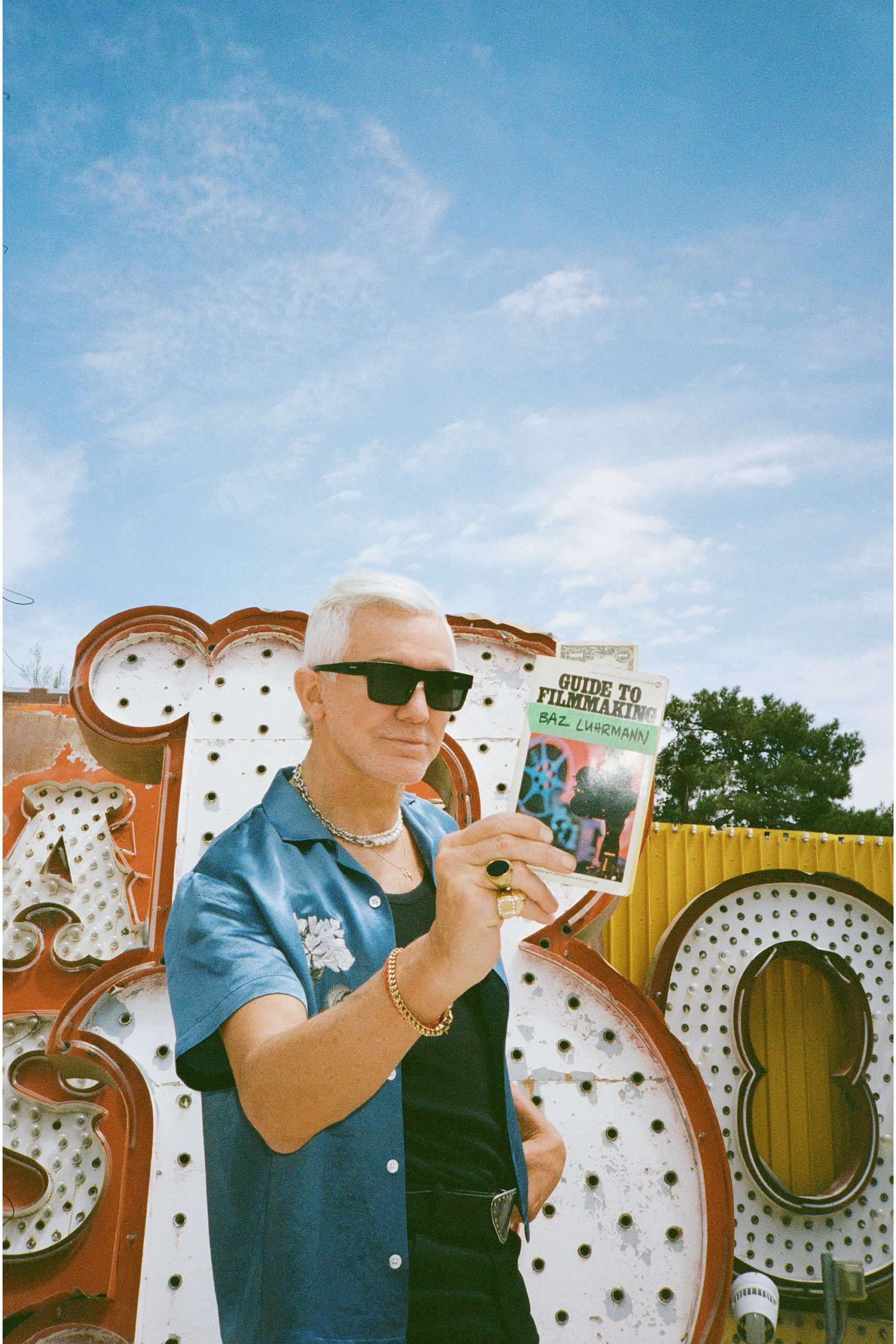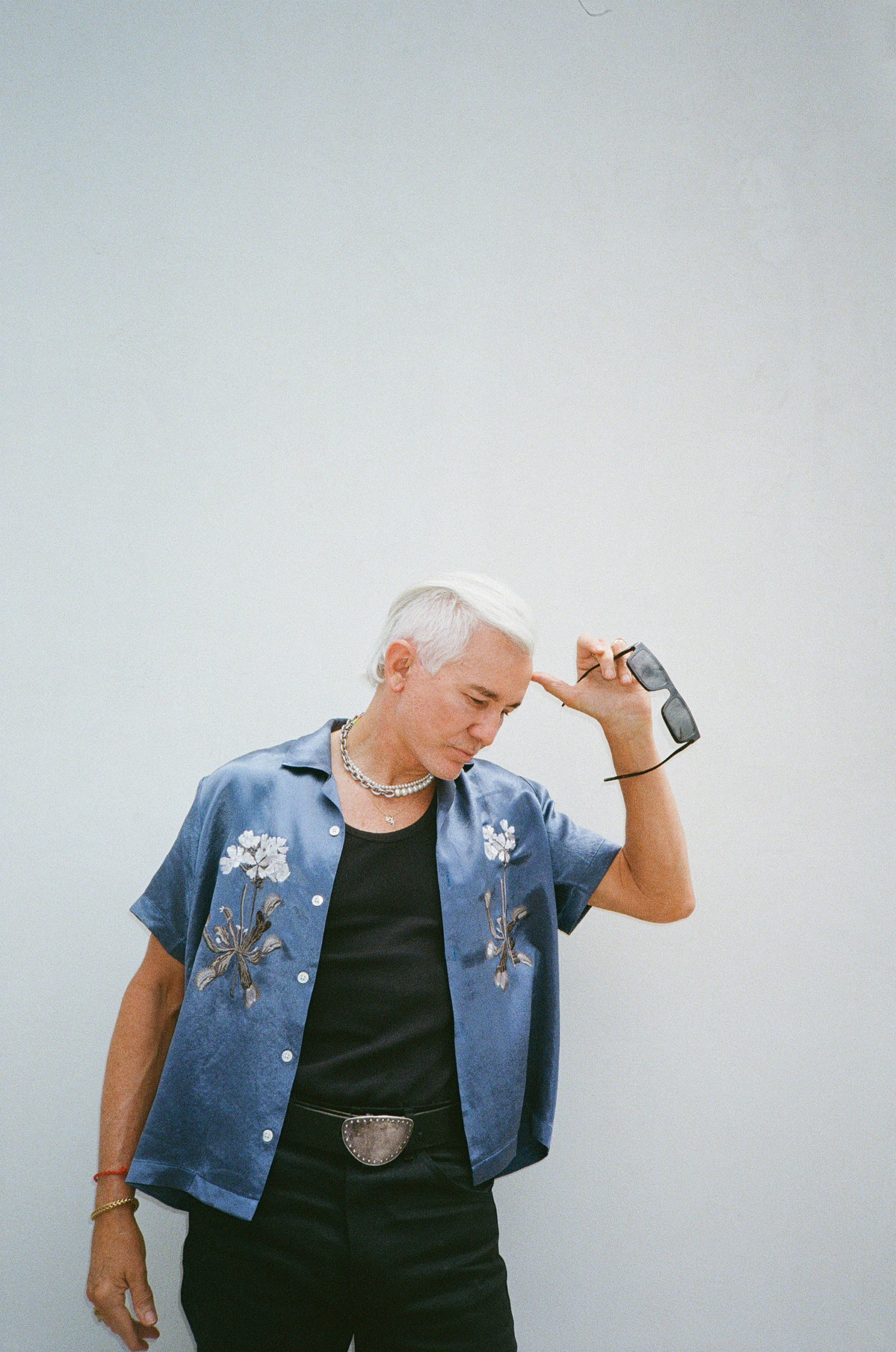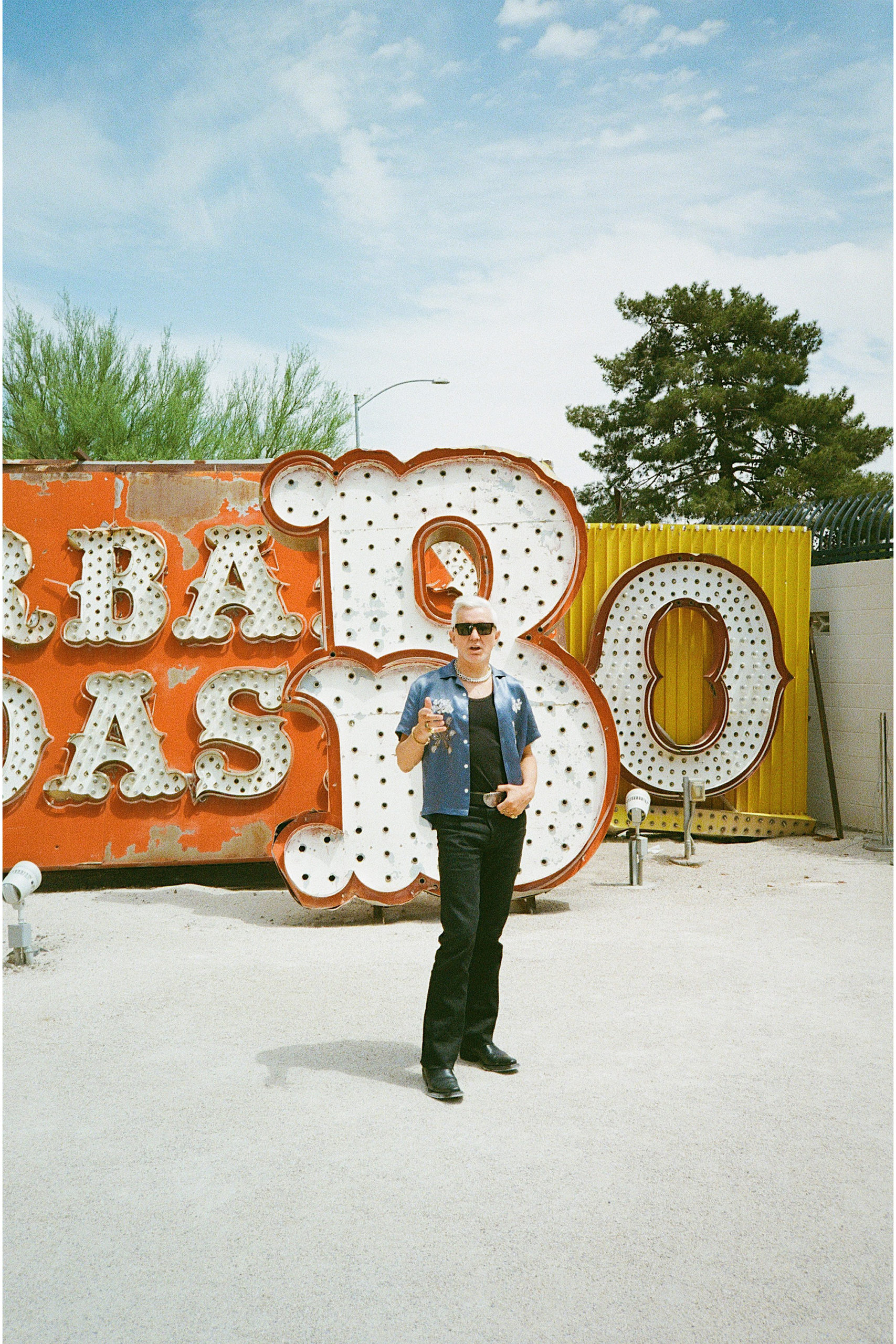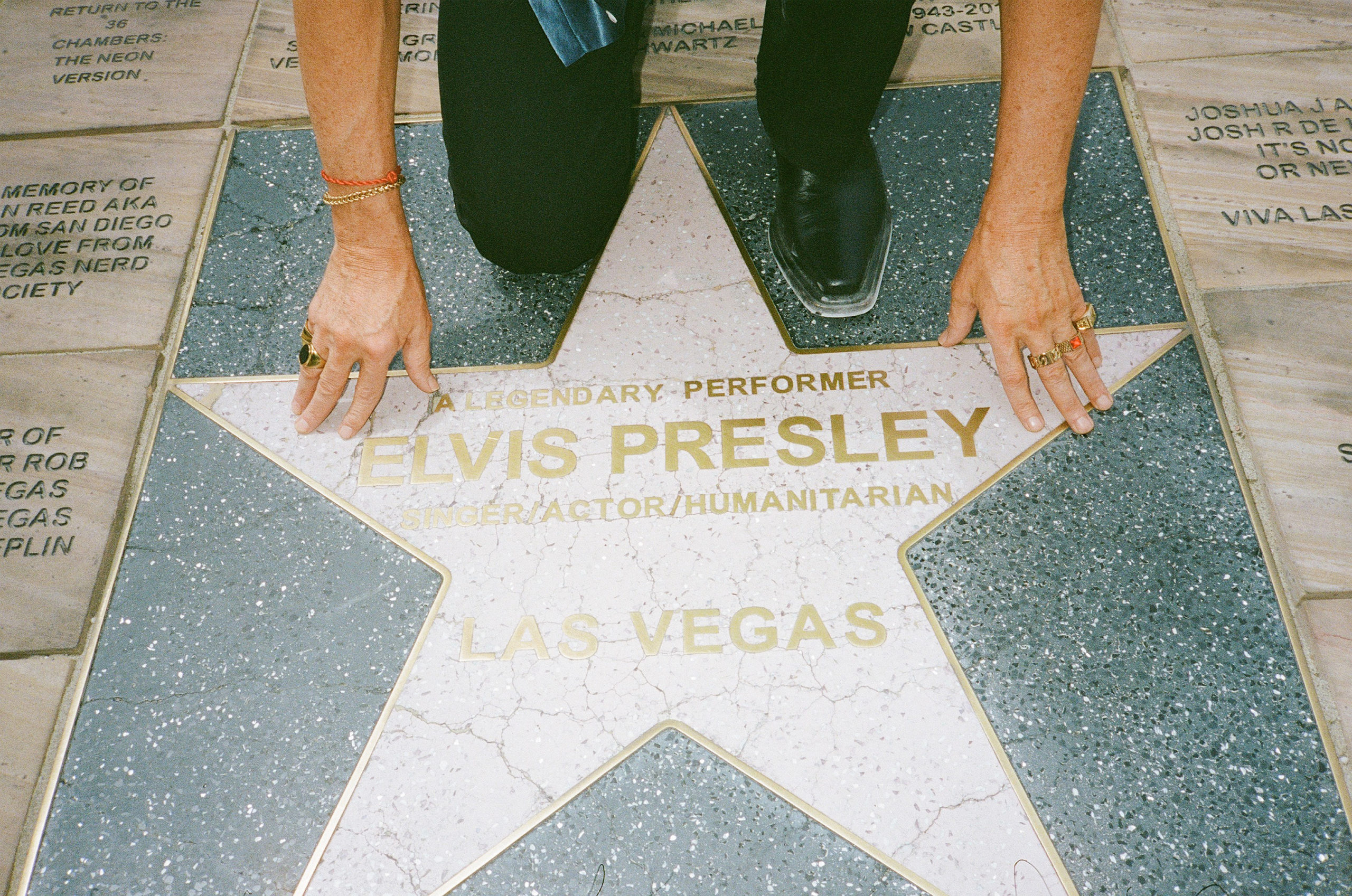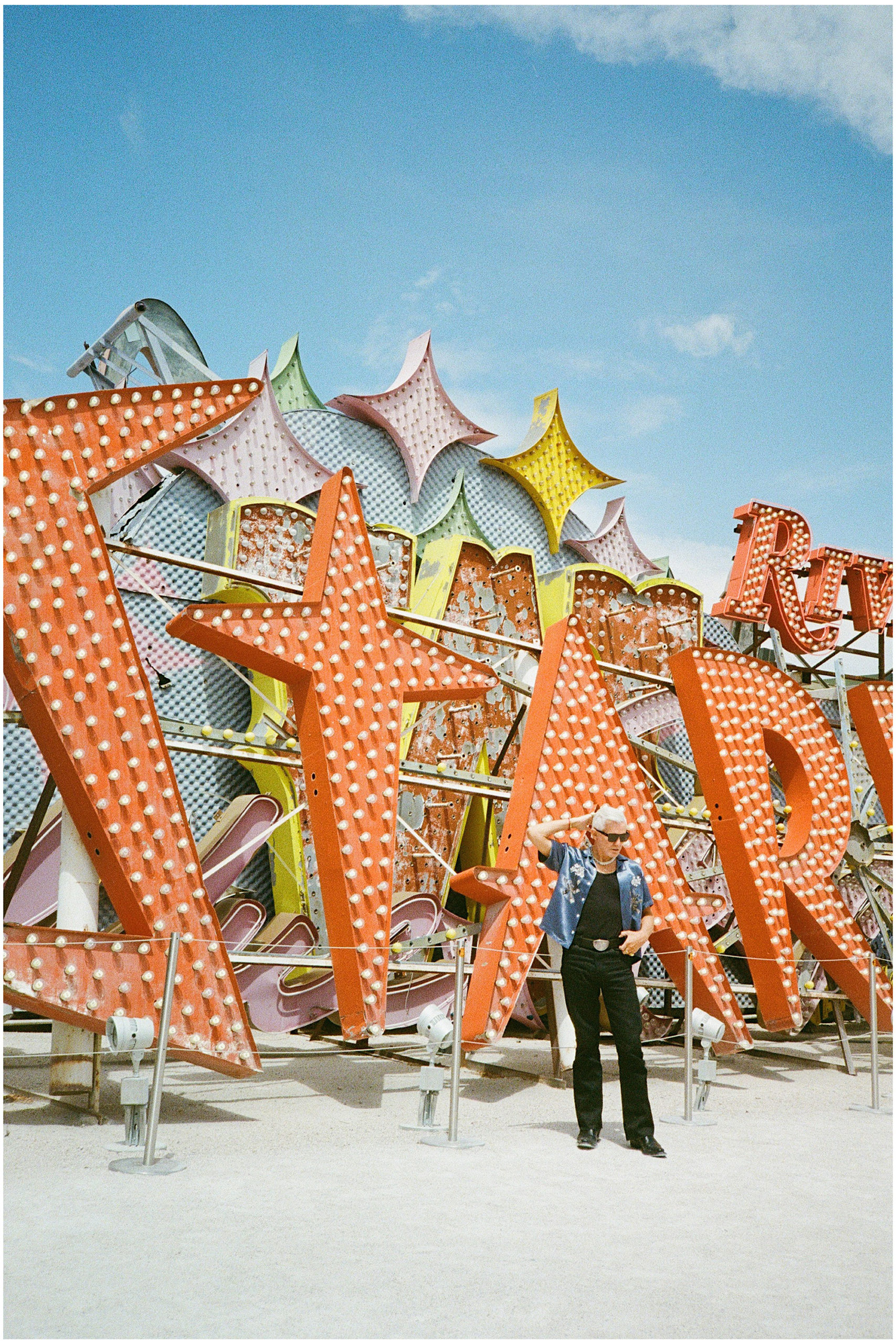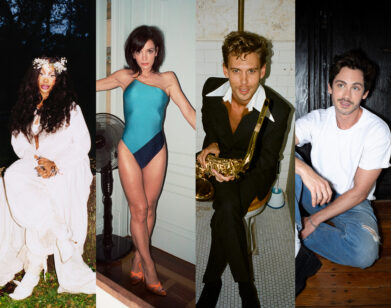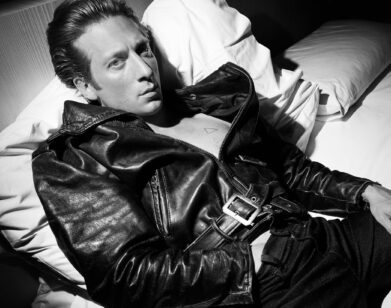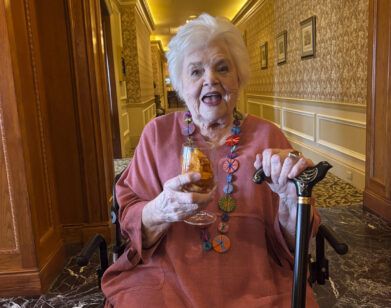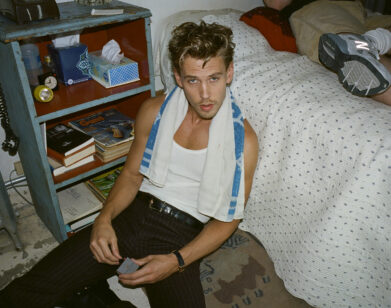Director
Baz Luhrmann Is Back, and Omer Fedi Is Taking Notes
Elvis, Baz Luhrmann’s extravagant new monument to the King of Rock and Roll, marks the director’s sixth feature film in 30 years. That’s not very prolific, but work takes time when you treat each production like a grand edifice to be constructed from the ground up. Famously hands-on with everything from set design to musical soundtracking, the 59-year-old Australian refreshes well-known iconography—the Shakespearean verse of Romeo + Juliet, F. Scott Fitzgerald’s prose in The Great Gatsby, Moulin Rouge!’s playlist of 20th century chart-toppers—through his singular brand of maximalism. His tendency to remix the classics brings him to the life and times of Elvis Aaron Presley Jr., as played by a revelatory Austin Butler, and to a conversation with another musical wunderkind, the producer and songwriter Omer Fedi. — CHARLES BRAMESCO
———
BAZ LUHRMANN: Young legend! I knew you’d be with your guitar!
OMER FEDI: I had to!
LUHRMANN: I’m in the back of a car on the way to Vegas. How about we don’t do the interview and work on a song instead?
FEDI: [Laughs] Let’s do it!
LUHRMANN: How are you? How was Paris?
FEDI: It was amazing. So inspiring.
LUHRMANN: We’re in Paris a lot. We have some French family. It’s always been my dreaming place. I like to say, “Dream in Paris, have fun in London, get lost in Shanghai, dance in Brazil, work in L.A., and live in New York.”
FEDI: I haven’t been to some of those places, but I can’t wait to go.
LUHRMANN: Well, add Tokyo in there as well. It’s magical.
FEDI: I remember the first time we hung out, you told me about some hotel in Tokyo.
LUHRMANN: The Claska!
FEDI: Yeah! And it’s in my notes to go to that hotel.
LUHRMANN: I love that about you, you actually write stuff down. You should never stop doing that.
FEDI: I feel like every time we talk, I learn something new. So I write it down in my notes like I’m in school again. You’re my teacher and I’ve got homework to do.
LUHRMANN: It works both ways, because every time I talk to you I learn something new, too. We connect across time in a good way. So did you see the Elvis reel? It’s so funny that I’m talking about Elvis with you and I’m on the road to Vegas. I’m literally going to go past that “Welcome to Las Vegas” sign that opens the movie.
FEDI: I love that. Yeah, I saw the reel and it’s amazing. I can’t wait to see the movie. I was wondering how different it was for you to create the film during the pandemic, especially since it’s such an American story and you had to do it all in Australia.
LUHRMANN: With the pandemic and the tectonic historic plates that are smashing together right now, including the war in Europe, let’s recognize that every hundred years or so, the human journey comes up against historic pressures. The pandemic was just the trigger point to remind everybody that no matter who you are, where you are, what country, what power, there’s always something bigger than the human being that can bring us all to the ground. And while most of it has been difficulty and pain, there have been some, for want of a better expression, silver linings. I was talking about this to someone last night, saying, “Right when the pandemic started, I was ready to shoot Elvis.” There I was rehearsing a scene: Tom Hanks as Colonel Tom Parker, Elvis’s manager, is guiding Elvis through the showroom and hundreds of girls are kissing him. And the first assistant director comes over and says, “I think Tom has that flu thing.” No one had ever heard of it, really.
FEDI: The beginning-beginning, I remember.
LUHRMANN: It was on CNN that night. And the world went, “If Tom Hanks can get it, anyone can get it. This is serious.” These were the early days, so there were hazmat suits. I got locked down with my children on the Gold Coast in Queensland, which is a bit like Florida—it has that same temperature and vibe. It was remarkable because no one really knew where we were all heading. It freed my mind and my spirit. Then there came a moment when Tom went back to the U.S. and it looked like the movie was not going to happen. But Tom and I talked about it and said, “Let’s be brave and push forward and get this done by Christmas,” which was pretty fast. I got to look at the structure of the film and I reconstructed the first part of it, which unlocked another perspective in me. I asked myself, “Am I telling this story in the best possible way?” I think that happened to a lot of people, not just in their creative process, but in their life. They were thinking, am I living my best life? How am I using my precious time? There’s been a recalibration of what is valuable, what is worth doing, what is being alive and what is not.
FEDI: Is there anything that you took for granted before that the pandemic has made you value more or revalue again?
LUHRMANN: I’ve always believed that you have to have your roots and your wings: Wherever you are from, you have to have your roots planted there—but by all means, live around the world and use your wings. I can live in New York, yet my roots in Australia are strong because that’s who I am. But when my kids came along and we started to live more in New York, we couldn’t get the roots in Australia, and I didn’t realize how much that affected my life, my spirit, my creative energy, and my creative process. The Gold Coast was not somewhere that I imagined we’d ever be shooting. It has a certain reputation. But when we got there, we discovered that it was this incredible, unexpected environment with a great energy. We were so swept up, so enlivened by it—not just by the Gold Coast, but by the state of Queensland and Brisbane. My dad was born in the Atherton Tablelands, which is this tropical, magical flat mountain area, in from the [Great] Barrier Reef. So it’s jungles and cows, if you can imagine that. You’ve got farmlands like in Ireland with tropical palm trees and tree kangaroos and cassowaries. It’s a really unusual place. One day you’ve got to travel there.
FEDI: It’s going in my notes.
LUHRMANN: Beautiful! But I think that for myself, and even for my daughter and my son who are New Yorkers, we all realized just how much we’ve got to keep these two points in our life, New York and Queensland. Sydney too, but Queensland has become our new energy spot. And by the way, it’s an incredible place to make movies. They make a lot of big action films there—Thor: Ragnarok and Aquaman, that kind of thing, because they have really high-end studios.
FEDI: Wow.
LUHRMANN: Oh man, I’ve actually got something to tell you. So we were there trying to make music, and you wouldn’t expect it to be a place to find great recording studios. But a guy says to us, “Hey, there’s this dude down in Burleigh Heads and he’s got this place where he keeps all of these motorbikes, but I think it might have been a recording studio.” So we go down there, and believe it or not, it has two Neve mixing desks in it. Two Neves!
FEDI: No way.
LUHRMANN: It turns out that the previous owner was the founder of a big surf company and he built his son the perfect recording studio, but when he sold it, the guy who bought it was a Harley-Davidson bike collector and just parked his Harleys in there. My music team was like, “Is this really happening?” So that’s where we mixed all of the big Elvis stage cues and stuff. When does that happen? When do you say, “I found two Neves around the corner”?
FEDI: That’s crazy. Out of nowhere. It was meant to be.
LUHRMANN: I really think so. And that shows in the film. Look, some people will say, “It’s the most American of stories. How can you shoot in Australia?” Well, I’m the ultimate outsider. I grew up in a very tiny town in the middle of nowhere in Australia, and I made all of Gatsby in Australia. But I’m of the firm belief in living the research. I had a research space in Graceland, I lived on and off in Memphis for two years coming and going in the South, researching with my team, meeting people that knew Elvis. I just lived it. Where you make it is different from where you dream it up.
FEDI: Of course. I’m big on research, too. With any artist or any song that I like, I’m always trying to see what influences are there. Sometimes people take it for granted how research and all those small details are so important for creating something.
LUHRMANN: I don’t know about you, but I could research forever and never make the movie because, to me, that’s the fun part. When I was doing Gatsby, I was living like F. Scott Fitzgerald. Unfortunately I probably leaned into the speakeasies a bit too much, but I lived it. And that’s the really rich, enjoyable part. The hard part is, how do you then turn that into making a piece of art? That’s the labor.
FEDI: Right, the research is definitely the fun part. That’s literally what I do every night before I go to sleep, just research something or some producer and try to learn something new about someone like Quincy Jones and what other albums he was working on when he made Thriller. Do you think you learned anything new about yourself or your work while making Elvis?
LUHRMANN: In a very profound way, I really did. When you’re young, you think, “I’ve got it now. I’ve found who I am.” But actually, self-revelation is a lifelong journey and you don’t control that process, you curate it. You learn as you go down the road: “That’s something I can change about myself, that’s something I can’t, and therefore, what can I do with this? How can I use it to be more alive?” I realized that I work in stories and ideas, and maybe I was like, “Movies take so much of my life, that’s why I avoid doing them.” I like to do them, disappear, and actually have a life, right? But I think what I learned, Omer, is there’s just no escaping. This is who I am and this is what I do, so I may as well have a life while I’m actually doing it. And ever since I took that attitude, I realized that’s what I used to do when I first started. And that’s probably why the work was more organic. It was more connected to me because I was living. Life fed art and art fed life. I didn’t try so much to protect one or the other, and I think I’m back to that. So it’s not so much something new—I’ve reconnected with who I really am. I don’t see myself as a movie maker or a music maker or an opera maker or a hotel creator, I just put myself on this creative adventure.
FEDI: Do you think that it’s important to you to take culture and history and bring it to the mainstream?
LUHRMANN: Absolutely. There are some people who are very focused on where we might go and they imagine the future, but I think that any future has already been lived in the past in a different way. You can’t know where you’re going until you understand where the human journey came from. So if we learn what our patterns were, we can decode them to make them alive again, and understood in this place, in this time, for this audience, for our people now. That’s what my function is as a storyteller.
FEDI: I was talking to my friend, who’s also an artist, about what the future of music is. Where should we go next? To figure that out you basically need to go back to the past and listen to what was done in the ’60s or ’70s or ’80s or ’90s. Like you said, humans have patterns—history always repeats itself, musically, artistically, in everything.
LUHRMANN: It’s why I did Elvis. I didn’t do it because I’m lionizing or a megafan. This movie is really about America in the ’50s, ’60s, and ’70s. And looking at America and popular culture during those periods of time, Elvis was at the center of it all, for the good, the bad, the ugly, and the beautiful. You can say what you want about Elvis, but he was a spiritual guy who, above all musical forms, loved gospel. That’s the reason I chose to do it. Someone like Shakespeare would write about the life of a famous king, but it wasn’t just about the king, it was about a bigger idea. You can’t talk about America in the ’50s, ’60s, and ’70s without dealing with the issue of race. Elvis was born in one of the few white-designated houses in a Black community during segregation and grew up there. Elvis was one of the few white faces on Beale Street—the birthplace of blues, soul, and ultimately, rock-n-roll, and when he starts to do his music and move like he does, it jumps the race line and all of the anti-desegregationists go, “This guy’s now in politics. We’ve got to get rid of him.” And then they send him off to Hollywood to make him family-friendly and he rebels again. So the journey goes on. In each era, Elvis, for one reason or another, whether he’s relevant or being relegated into a bubble, offers a great prism through which to understand what was going on in America. So I’m using it as a canvas to explore that.
FEDI: I really can’t wait to see this movie.
LUHRMANN: You know what? I can’t wait to see the movie either. That’s why I should go and finish it, don’t you think? [Laughs]
FEDI: [Laughs] Totally. The star of the movie, Austin Butler, is someone newer and younger, and you worked with Leo [DiCaprio] in the beginning of his career. Do you think that’s something that you care about, working with people who are on the come-up?
LUHRMANN: Yes. In the end, I always make the choices based on who serves the story best, whether it’s an unknown or an A-lister. And in this movie, we have both. Austin wasn’t unknown, but it’s well-publicized that other ideas were being explored. I try not to do auditions; I do workshops. Austin was incredible. First, I got a video of this young man at a piano in a flood of tears singing “Unchained Melody.” Then, I saw an audition tape and went, “Wow.” Then I got a cold call from Denzel Washington, who I do not know, and he said, “I’m calling you because I’ve been onstage with this young actor called Austin Butler on Broadway. This young man works in a way I’ve never seen. He just lives it. It’s like a life-and-death commitment to the art.” So when Austin came in, I put him through the ringer in the workshop process. But I’ve got to tell you, he sings all the young Elvis songs. He moves. And he has this devotion to not doing an impersonation of Elvis, but revealing the soul and the humanity of the man. With Leonardo, I went on that journey 30 years ago on Romeo + Juliet. And I see it in Austin. So, to answer your question, the idea of helping a relatively unknown artist begin to discover new notes on their instrument or to reveal their music as well as they can—to use a metaphor—is what keeps me vital. My job is to create an environment of play, because it’s called play acting. You need to have an environment where fear is kept outside because people won’t play if they’re scared. My job is to keep the fear away.
FEDI: Right.
LUHRMANN: For various reasons, I wasn’t able to get Priscilla Presley involved as much as I wanted to, and she’s not technically connected to the film, but Austin and I worried so much about what she would think. Priscilla saw the film while I was in the air coming to America and she wrote me a personal note which fills me with emotion and, I have to say, Austin actually cried reading it. I won’t share all of it, but I will share one little line. She said, “Honestly, if my husband was here today, he’d say to Austin, ‘Hot damn, you are me.’” And I don’t think he’ll ever get a better review than that.
FEDI: That’s amazing. He killed it. Sometimes there’s this feeling when something is right. And it’s our job to capture that vibe, to get people there. Whether it’s a recording studio or a movie studio, like you said, fear can’t be in the room.
LUHRMANN: I’m going to write a sign for my creative space that says, “Please check your fear at the door.”
FEDI: I’m going to tattoo it on myself. Just tell me when and where and I’m doing it.
———
Grooming: Mira Chai Hyde using House of Skuff Potion No. at The Wall Group
Production: Paige Viti
Fashion Assistant: Jose Rodrigo
Location: The Neon Museum Las Vegas

